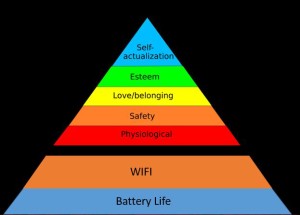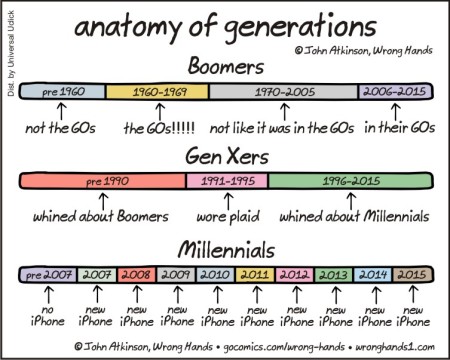
https://en.wikipedia.org/wiki/Maslow%27s_hierarchy_of_needs
When discussing basic human needs, most people are familiar with the work of Maslow and his pyramid of basic humans needs. Maslow’s five basic human needs were: physical, safety, social, esteem, and self-actualization. His pyramid was built upon the premise that when one need is fulfilled a person seeks to fulfill the next one. Maslow believed that people are motivated to achieve certain basic needs. For example, after sitting on a couch for several hours, our physiological need to eat, drink, or go to the bathroom will pull us away from any video game not matter how exciting (or mind-numbing).

Maslow’s Hierarchy up-dated for today’s wired world.
My three developmental tasks of adulthood – discovering vocation, developing community, and establishing autonomy– are internally motivated because humans were created with desires to love, to be free, and to be needed. These basic human needs are based upon God’s creative design. Since each developmental tasks is rooted in a basic human need, individuals do not need to be convinced of their importance, but will naturally work towards their fulfillment.
Vocation – Humans desire to be needed.
Humans desire to have a role in their world that makes an impact upon our self and the lives of others. Vocation provides us the ability to be useful and make a difference in this world. While paid vocation often fulfills other human desires (like income for physiological needs and security), it also fulfills our God-given desire to work, create, and design. God is a worker, and is glorified as we follow His ways. Work was not a result of the fall, but the ability to work is a gift (Genesis 3:17-18).
Autonomy – Humans desire to be free.
Regardless of your theological beliefs concerning determinism or free-will, thoughts of being controlled or unable to affect the outcome of your life can lead to depression, anxiety, or apathy. Autonomy is the ability to make decisions and deal with the consequences. A sense of autonomy allows the individual to see they can make decisions that will change the outcome of their life. Autonomy provides hope and motivation to the individual to affect our current circumstances.
Community – Humans desire to be loved.
We seek community because we desire to love and to be loved. Our God is capable of love, and of relationships with His creation. Veith states, “From the beginning, God put us in families, tribes, societies. God ordained that we be in relationships. He ordained that we need each other.” (God at Work, 2002, 41).
When our basic needs (vocation, autonomy, and community) are unmet, we are motivated to action. Our desires increase in intensity the longer they remain unmet. A lack of desire to meet these needs can be rooted in a disability, an addiction (drugs, alcohol, or entertainment) or depression.
The church must seek to meet the needs of emerging adults, through offering assistance in their journey to meet the basic human needs of vocation, autonomy, and community. I believe that church who create mentoring environments focused on these needs will draw and retain emerging adults.
Dr. G. David Boyd is the Founder and Managing Director of EA Resources, a non-profit that exists to help parents and churches understand the challenges of emerging adulthood.
 While many are complaining about last year, 2016 was a great year at EA Resource (which stands for Emerging Adult Resources). This year our web traffic hit an all time high. EA Resources also launched the EA Network.
While many are complaining about last year, 2016 was a great year at EA Resource (which stands for Emerging Adult Resources). This year our web traffic hit an all time high. EA Resources also launched the EA Network. Dr. G. David Boyd is the Founder and Managing Director of EA Resources. If he can help you community understand and minister to emerging adults, you can contact him at gdavid@earesources.org.
Dr. G. David Boyd is the Founder and Managing Director of EA Resources. If he can help you community understand and minister to emerging adults, you can contact him at gdavid@earesources.org.












 At the developmental margins by definition, the in-betweeness of young adults is a huge part of why congregations are so flummoxed about them. Churches have long served children, youth, parents, empty-nesters, and elders. But emerging adults are a special kind of moving target, no longer youth but not quite adults.
At the developmental margins by definition, the in-betweeness of young adults is a huge part of why congregations are so flummoxed about them. Churches have long served children, youth, parents, empty-nesters, and elders. But emerging adults are a special kind of moving target, no longer youth but not quite adults.

